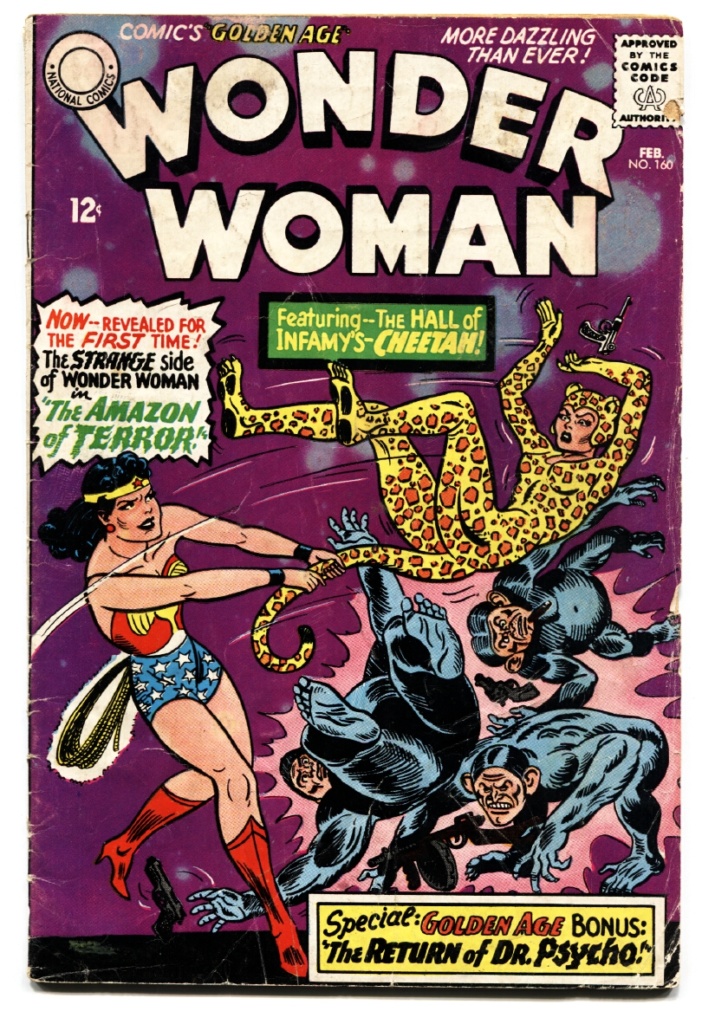Wonder Woman
Listen to the Recess! Clip
| Author | Eve Cech |
| Air Date | 7/7/2005 |

Wonder Woman Transcript
“Beautiful as Aphrodite, wise as Athena, strong as Hercules, and swifter than Mercury” it’s everything I wanted to be as a girl growing up in the 1950s, reading Wonder Woman comics. Along with these awe-inspiring attributes, Wonder Woman had her own, invisible airplane to get around in, and a costume that was — well — super wondrous. Boys and men didn’t boss Wonder Woman around, unlike my other comic book favorite at the time, the spunky Little Lulu, who was perenially being excluded from the boys’ clubhouse. Wonder Woman rescued people, she defeated the bad guys — just like the male heroes did in the comics my younger brother was ingesting. At the time, of course, I had no way of knowing that the creator of the comics that had fascinated me in those days — which were hardly characterized by the capable women of the war years — was a Harvard-educated psychologist who had invented the lie detector, and who was an early advocate for what would, decades later, come to be called, the Women’s Movement.
Wonder Woman’s creator, William Moulton Marston, fervently believed that the comic strip character that he had launched in 1941would be, as he wrote, “psychological propaganda for the new type of woman who should, I believe, rule the world. There isn’t love enough in the male organism to run this planet peacefully.” In his engrossing book, The Complete Story of Wonder Woman, author Les Daniels reminds us that she appeared just a few months after the bombing of Pearl Harbor and America’s entrance into World War II. In the story, an American pilot, Steve Trevor, crashes on Paradise Island, an island of beautiful, immortal women where he meets Princess Diana, who nurses him back to health and then accompanies him home, in the guise of a nurse, where she is sent to help “America, the last citadel of democracy, and of equal rights for women.”1
Since 1941, Wonder Woman has joined the pantheon of popular culture icons, as she has made her way from those first, simple drawings, into television, then later materializing as a Barbie Doll, a Pez dispenser, and various kinds of action figures. But despite the merchandising of her, she has continued as a comic book into the new millenium, perhaps because there’s something abiding about Wonder Woman. Perhaps the president of DC Comics, Jenette Kahn, says it best when she writes: “Here was this beautiful, independent, self-sufficient woman who was a humanist. She was a feminist but she liked men. She had a reverence for all living things. Her interest was in a utopian society of equality and peace [and] . . I feel that she’s a national treasure.”2
Notes:
1 Les Daniels, The Complete Story of Wonder Woman (San Francisco; Chronicle Books, 2000), p. 25.
2 Ibid, p. 201
Explore This Topic Further
Books
[supsystic-gallery id=4]Film
View the trailer for the 2012 documentary Wonder Women!: The Untold Story of American Superheroines.
Further Reading
Sadri, Houman. “‘Submission is Faith in the Strength of Others’: Synthesizing Male and Female Aspects of War in Azzarello and Chiang’s Wonder Woman.” ImageTexT, vol 9, no. 3, 2018, n. pag. Click here to view.